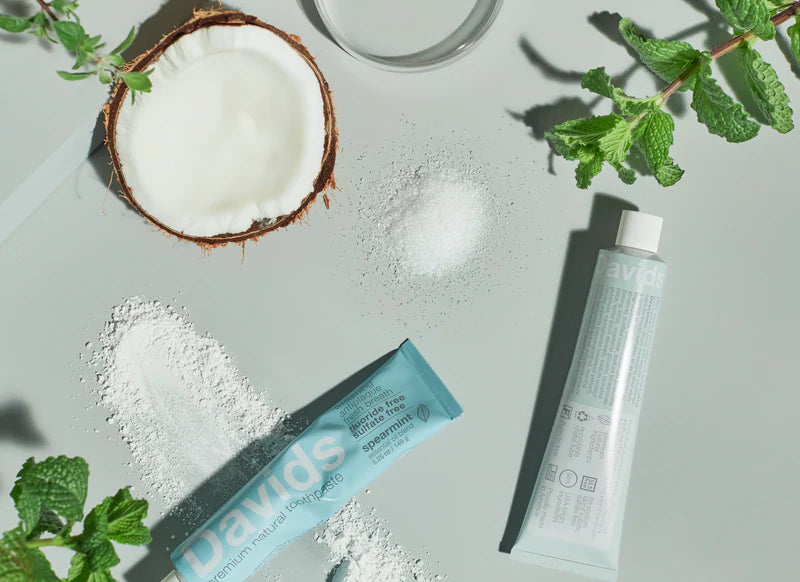While there’s a little overlap between the two labels (and the ethics behind them), the terms vegan and cruelty-free actually refer to two different things.
- Vegan means that the product contains no animal-based ingredients and no animal by-products.
- Cruelty-free means that the product (and sometimes, its individual ingredients) has not been tested on animals, but it could contain animal-derived ingredients or animal by-products.
These definitions may seem simple, but in the industry of consumer packaged goods (CPG), there’s a lot of room for confusion, misinformation, and false claims. Don’t worry, we’ll dive into those details.
Also, find comfort in the fact that Davids is both a vegan (you can check out our ingredients) and cruelty-free toothpaste (leaping bunny certified), so you don’t have to worry about misinformation with us.
can a product be vegan but NOT cruelty-free?
Technically yes, but not in our book.
A product can have no animal by-products, but the company can still test it on animals. Consider this a red flag....a marketing ploy for unethical brands to appeal to vegan consumers without backing up their practices with ethics, genuine care, or transparency.
You see, some laws actually require companies (including CPG companies) to test on animals. We say this to inform you, not to defend the acts of companies who test on animals.
According to PETA, various government regulations around the world require animal testing depending on a few different factors, some of which include:
- The product type...think consumer goods, drugs, pesticides, vaccines, GMO foods, etc.
- The amount of potential exposure this product will have on humans or the environment
- The product’s known or anticipated toxicity
During testing (which can involve hundreds to thousands of animals), the animals may be forced to swallow, inhale, or absorb (through the skin) the substance of interest for extended periods of time. In the U.S. specifically, once animal testing has been approved, there are no laws in place to protect the animals from physical or mental suffering.
While we do think that proper testing of new (and existing) products is necessary and beneficial, there are several non-animal methods that can replace these cruel practices. Some of these animal-free methods include computer modeling, in-vitro testing, testing with human volunteers, and more.
Not only would these methods end animal cruelty....they are often faster, more cost-effective, and more predictive of human health responses.
common non-vegan ingredients to look out for
We talk about this more in-depth in our previous article, 10 easy vegan swaps for your everyday self-care products, but some common non-vegan ingredients in self-care products include:
- glycerin: animal fat that’s often used to thicken conventional toothpaste, shampoo, lotion, soaps, and more
- lecithin: a moisturizer, usually found in shampoo and conditioner, that’s extracted from sheep’s skin
- gelatin: used to coat capsules like vitamins and other medications and make your toilet paper soft yet strong
- carmine: a red dye commonly used to color makeup
- hyaluronic acid: a hydrating ingredient that’s sometimes extracted from rooster combs
- wax: that covers many brands of lip balm and floss and is poured to make candles
And these are just a few of them! Be sure to spend time checking if your everyday items truly contain no animal by-products.
can companies lie about being vegan / cruelty-free?
Definitely! But first, we need to set the record straight and say that we would never lie about Davids being a vegan or cruelty-free toothpaste.
Unfortunately, we can’t say the same for all companies. You see, when a massive company mass-produces consumer goods, it can become very difficult to track its supply chain and maintain its claims across global markets.
Let’s dig into this a little bit more.
Say a large company mass produces conventional toothpaste. They claim it’s cruelty-free toothpaste, but they source low-quality ingredients from all over the world, and they distribute their final product all over the world too. How can this go wrong?
- Maybe the large company doesn’t test on animals, but some/all of their suppliers do.
- Maybe the large company would be able to eliminate animal testing if they sold products to only people in the U.S., but because they’ve expanded to a global market, they’re required to test on animals.
In fact, China requires animal testing for all cosmetic products (even imported products), so if you’re buying a product that’s also sold in China, it may be cruelty-free in your country, but not in China. On top of this, there’s no globalized legal definition for the “vegan” and “cruelty-free” labels, so companies can slap these labels on their products with no repercussions or liability.
It’s details like these that confirm that the vegan and cruelty-free labels are not always simple or straightforward.
how to stick to your values
Don’t worry, certifications and other indications still exist to help you identify products that are truly vegan and cruelty-free. When buying your self-care and home products, be sure to look out for:
- the leaping bunny certification: Davids proudly sports the leaping bunny certification, aka the only globally recognized label that certifies no animal testing was used in the development of a product
- ingredient transparency: all of the ingredients in our cruelty-free toothpaste are sourced and derived from the earth and contain no animal by-products.
Plus, 98% of our ingredients originate in the U.S., meaning we know exactly where they come from, and our “made in the usa” claim is legitimate.
If you haven’t already, give our vegan + cruelty-free toothpaste a try!

